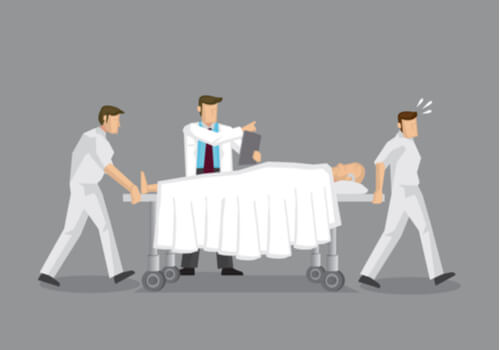
Close to 12 lakh new cancer cases were detected in 2018 in India. Out of these, breast cancer was the one with a higher prevalence in women, whereas cancers of the lip or oral cavity ranked high in men. Less than 8 lakh Indians succumbed to death due to cancer alone in the same year. Not only this cardiovascular diseases, kidney ailments, stroke and lung diseases are other critical illnesses which are on the rise. The statistics are alarming.
Deepti had been spending sleepless nights recently. Three days back, her mother complained of abnormal bleeding and pain in the lower abdomen and was rushed to the hospital in the night. A thorough diagnosis revealed that she was suffering from second stage cancer of the uterus and needed to be admitted immediately. It was as if Deepti’s world came crashing down that night.
The absence of a critical illness insurance policy hit her hard when she was told by the cashier that her plan did not cover cancer. She made a cash payment. More than finances, she was worried about how her mother would cope with a critical illness such as cancer. How could she help?

-
Accept the reality:
When minor stresses tend to push our buttons, you can only imagine how devastating breaking the news of the diagnosis of a life-threatening illness such as cancer to a patient can be. They go through a roller coaster of emotions, often negating the reality. Denial is often followed by grief, anger and sadness, which are the feelings that Deepti’s mother went through starting from her diagnosis to treatment. With time, she learnt to acknowledge them as normal and learnt to accept your situation for what it is. This is the key to coping with and eventually beating the critical illness. -
Develop a plan of action:
So, you have been diagnosed with a critical illness. What next? What is it that you can do to elevate the quality of your life? Taking control of your life helps you better cope with your situation. Deepti’s mother always kept a pen and paper handy right next to her bed. She would write down questions she wanted to ask the doctor, while Deepti would set up medicine reminders and give her healthy meals. All these proactive steps bring structure to the day and make you feel in charge of your life. -
Find support:
Knowing that you are alone in fighting a life-threatening condition can make coping with a critical illness a traumatic and depressing experience. That’s how Deepti felt after her mother’s diagnosis. However, she confided in her maternal uncle not only about how she felt but also how crucial critical illness insurance could have been at this stage. He assured her of financial support and also listened to her patiently. Then he suggested she find a cancer support group either through her doctor in the hospital itself or in the same city. In a few days after Deepti found one such online support group, she noticed a change in her mother, who was now more confident and cheerful than before. This was a good idea to help her mother cope. You can also hire a nurse at home or any other caregiver that could help you ease your life. -
Enjoy life:
Coping with a critical illness can take an emotional and psychological toll on you. Remember to do things that you enjoy each day. Today Deepti’s mother goes for radiation but with a smile. She has made friends with her cancer support group friends, and they meet every week. She also has a journal where she writes her thoughts, goes for yoga in the morning and has resumed her interest in music. You may like to enjoy the sunrise, go for a walk, or spend quality time with your spouse, children and grandchildren. Make the most of each day by surrounding yourself with positivity and energy.
Navigating your way to recovery after being diagnosed with a critical illness can be tough, but it can be an enjoyable process once you learn ways to cope better. Deepti’s mother has defeated cancer today, thanks to her coping techniques.
You might not want to dip into your savings or ask someone for financial help in such a situation unlike Deepti. Buying critical illness insurance early in life can help ease your financial troubles when such a sudden medical emergency demands a huge cash outflow. You or your loved one can recover with peace of mind.
Apart from that, incorporating strategies that help you feel emotionally strong and equip you psychologically to meet this challenge head on, can make a world of difference to your treatment.


Comments